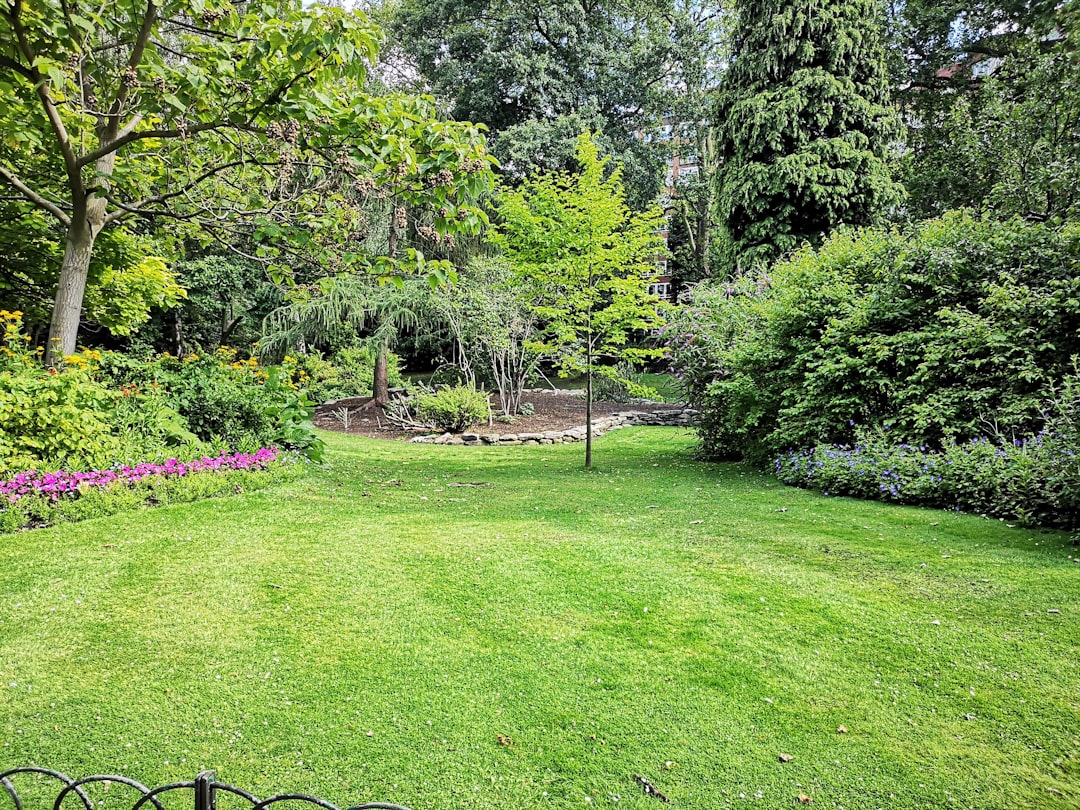 Photo from Unsplash
Photo from Unsplash
Originally Posted On: https://smldmv.com/the-benefits-of-mulching-for-your-lawn-and-garden/
The Benefits of Mulching for Your Lawn and Garden
Overview
Mulching is an essential practice for maintaining a healthy and beautiful lawn and garden. In this blog, SML Services explores the many benefits of mulching, including enhancing soil health, conserving moisture, improving curb appeal, and providing natural weed control. We’ll also discuss the different types of mulch, when and how to apply it, and common mistakes to avoid.
Highlights
- What is mulch?
- Mulching enhances soil health
- Mulch conserves moisture
- Ward off weeds with mulch
- Improving curb appeal
- Erosion control
- The best time to mulch
- How much mulch do you need?
- Common mulching mistakes to avoid
Introduction
Have you ever wondered why so many of your neighbors’ lawns and gardens look so lush and well-maintained year after year? Chances are, they’re using mulch.
Whether you’re a seasoned gardening enthusiast or a first-time homeowner looking to improve your landscape, understanding the benefits of mulching and the proper methods can make a significant difference.
Join SML Services as we explore how mulching can enhance soil health, conserve moisture, improve curb appeal, and more.
What Is Mulch?
Before diving into the benefits, let’s first clarify what mulch is. Mulch is a layer of material applied to the surface of the soil in garden beds, flower beds, and around trees and shrubs.
Mulch can be made from a variety of organic or inorganic materials, such as:
- Wood chips
- Straw
- Leaves
- Grass clippings
- Rubber
- Stone
Organic mulches, such as wood chips or compost, are particularly beneficial because they decompose over time, enriching the soil and improving its structure. As they break down, they release valuable nutrients that support plant growth and help maintain a healthy soil ecosystem.
However, if you’re looking for a low-maintenance option or need mulch that won’t break down quickly, inorganic mulches are another great choice. These types of mulches, such as gravel, stones, or rubber, do not decompose over time. While they won’t enrich the soil as well as organic mulches, they still provide benefits like weed control, moisture retention, and temperature regulation.
Now that we understand what mulch is, let’s dive into the many reasons why you should incorporate it into your landscaping routine.
Mulching Enhances Soil Health
One of the primary benefits of mulching is its ability to improve soil health. When organic mulches like wood chips or straw decompose, they enrich the soil by adding essential nutrients such as nitrogen, phosphorus, and potassium. These nutrients are vital for plant growth and help maintain a balanced, fertile environment in your garden. Over time, mulching contributes to the formation of humus, which improves the soil’s structure, texture, and aeration.
Mulch also encourages the growth of beneficial soil organisms such as:
- Earthworms
- Fungi
- Bacteria
These organisms play a crucial role in breaking down organic matter and creating a healthy soil ecosystem. Healthy soil, in turn, provides plants with the necessary support to grow vigorously, resulting in stronger roots and healthier plants overall.
Soil Temperature Regulation for Healthier Lawns
In addition to nutrient benefits, mulching helps to regulate soil temperature. During the summer, mulch acts as an insulating blanket that keeps the soil cooler, protecting plant roots from extreme heat. In the winter, mulch helps to protect plants from freezing temperatures and prevents frost heaving, which can damage roots.
Mulch Conserves Moisture
Water conservation is another significant benefit of mulching. Mulch serves as a barrier between the soil and the atmosphere, reducing water evaporation from the soil surface. This is particularly important during hot, dry months when plants need consistent moisture to thrive.
Reduce Your Water Usage by Mulching
By retaining moisture in the soil, mulch reduces the need for frequent watering, which saves time and effort while also helping to reduce your water bills. The moisture-retaining properties of mulch are especially beneficial in areas with dry spells or in regions where water conservation is a priority.
For plants that require consistent moisture, like vegetables and flowers, mulch helps keep the soil evenly moist, preventing the soil from drying out between waterings. It creates an ideal environment for plant roots, promoting healthier growth.
Ward Off Weeds With Mulch
Mulch acts as a natural barrier to weeds, one of the most common and frustrating issues for gardeners. When applied correctly, mulch helps prevent weed seeds from germinating by blocking sunlight from reaching the soil surface. This reduces the number of weeds that can take root and spread throughout your garden.
Mulching also helps reduce the effort required for manual weed control. With a thick layer of mulch in place, you’ll spend less time pulling weeds and more time enjoying your garden. Organic mulches, such as wood chips or grass clippings, can be especially effective at suppressing weeds, as they create a dense mat that prevents weed growth.
Improving Curb Appeal
One of the most noticeable benefits of mulching is its ability to instantly enhance the appearance of your landscape. Whether you have flower beds, vegetable gardens, or tree rings, mulch adds a neat, polished look to any garden area.
The rich color of mulch—whether it’s the natural browns and reds of wood chips or the deep blacks of rubber mulch—creates a visually appealing contrast with the greenery of plants and lawns. Through your landscapers or your local suppliers, you’ll be able to find a mulch that suits your preferences.
Make Your Garden Beds Stand Out
Mulch also helps to define garden beds and plant borders, giving your yard a well-organized, professional appearance. A fresh layer of mulch can make a garden look well-maintained and cared for, increasing the overall appearance of your property.
Erosion Control
If your garden or lawn is located on a slope or in an area prone to erosion, mulch can help protect the soil from being washed away during heavy rainfall. When applied properly, mulch helps to reduce water runoff, which can carry away topsoil and nutrients. This is especially important in areas with loose or sandy soil, which is more prone to erosion.
Mulch helps to slow down the movement of water and encourages it to soak into the soil instead of running off the surface. By improving soil structure and reducing erosion, mulch ensures that the soil stays intact, protecting your plants and landscape for the long term.
When’s the Best Time To Mulch?
Any landscaper will tell you that timing is an essential factor in mulching. The best time to mulch your lawn or garden is typically in the spring after the soil has warmed up but before the heat of summer sets in. This allows the mulch to settle in and begin providing its benefits, such as moisture retention and temperature regulation, during the warmer months.
For a fall mulch application, it’s a good idea to apply mulch before the first frost. This provides insulation to plant roots during the cold months and helps protect plants from harsh winter temperatures.
Be careful not to mulch too late in the fall. Applying mulch when the ground is frozen or too wet can cause moisture problems and rot on your DC lawn.
How Much Mulch Do You Need?
The amount of mulch you need depends on the size of the area you’re mulching and the depth of the mulch layer. A general rule of thumb is to apply mulch to a depth of 2 to 4 inches. This is thick enough to provide all the benefits of mulching, such as moisture retention and weed suppression, without suffocating the soil or promoting fungal growth.
To determine how much mulch you need for a specific area, your landscapers will measure the space. They’ll find the length and width of the space you want to mulch and multiply them to get the square footage. After that, they’ll determine the ideal mulch depth and calculate accordingly.
Common Mulching Mistakes To Avoid
While mulching is relatively simple, there are a few common mistakes that can undermine its effectiveness:
- Over-mulching: Applying too much mulch can suffocate plant roots, prevent water from reaching the soil, and promote fungal growth.
- Placing mulch too close to plants and trees: Piling mulch directly against the trunk of trees, shrubs, or plant stems can lead to moisture retention and create a perfect environment for rot and pests. Always leave a small gap between the mulch and the base of plants.
- Using fresh mulch too early: Fresh mulch, particularly from wood or bark, can be high in nitrogen, which can steal nutrients from plants if applied too early. Allow it to age before application to avoid harming your garden.
- Neglecting to replenish mulch regularly: Mulch breaks down over time, so it’s important to replenish it every year to maintain its benefits.
Keep Your Lawn Looking Great With the Help of SML Services
Mulching is an incredibly beneficial landscaping practice that helps improve soil health, conserve moisture, prevent weeds, and enhance the appearance of your lawn and garden.
With proper timing, the right amount of mulch, and careful application, you can reap the many rewards of mulching throughout the year. Whether you’re looking to improve your curb appeal or create a healthier, more sustainable garden, mulching is a simple yet highly effective solution—and SML Services’ lawn care professionals are here to spread the mulch.
Reach out to our landscapers for all your lawn-related needs. We’ll mulch, mow, offer guidance, and everything in between. Contact us at (202) 425-1872 to learn more about what we can do for you.






